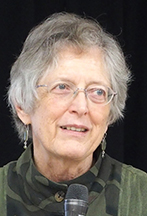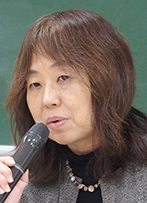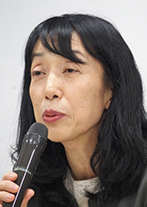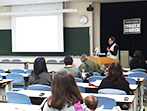IGS hosted an international symposium entitled “Women in Science and Engineering,” on January 18, 2016, at Ochanomizu University. The symposium was coordinated by Dr. Anne Walthall (Specially Appointed Professor, IGS / Professor emerita, Univ. of California, Irvine) and Dr. Masako Ishii-Kuntz (Director, Institute for Gender Studies/ Professor, Ochanomizu Univ.). Dr. Carroll Seron (Professor, Univ. of California, Irvine) presented her research finding as a keynote speaker, and two Professors from the Natural Science Division of Ochanomizu Univ., Dr. Misako Kato and Dr. Keiko Takano, participated as panelists.
Dr. Seron’skeynote speech, based on her research on American students in Engineering and titled “Persistence is Cultural: Professional Socialization and the Reproduction of Sex Segregation”, revealed that how the male oriented culture of engineering field affected the socialization process of both male and female students to be processional scientists and engineers. When they enter universities, all students, male and female, stand at the same starting point. However, sexism in the male dominated science and engineering profession affects the position of female students. Through the stages of training, education and internship, they are gradually pushed out to disadvantaged positions, such as supporting roles. This causes the loss of self-confidence or disappointment towards the scientific and engineering professions. As a result, those female students tend to give up to be specialists in that field. It suggests that professional socialization is the factor which reproduces gender segregation in the science and engineering fields.
Next speaker, Dr. Kato, presented a report “The Female Ratio in Scientific Societies” which is an analysis of difference of female ratio among academic associations of scientific fields. It is an outcome of “Large-Scale Surveys on Gender Equality in STEM” conducted by Japan Inter-Society Liaison Association Committee for Promoting Equal Participation of Men and Women in Science and Engineering (EPMEWSE). The survey classifies scientific fields into five groups: Architecture; Information and Engineering; Mathematics, Physics, Chemistry and Earth; Biology, Medical and Agriculture; and Complex area. The female ratio of these groups is between 2% and 24%. The ratio is high in the Biology group and low in the Engineering group. Architecture is also an Engineering field but its female ratio is exceptionally high. In recent years, the female ratio has been increasing in many scientific societies.
Dr. Takano’s presentation inrtoduced a result of a survey on Ochanomizu University graduates researching the impact of mothers in course selection of Science, Technology, Engineering, and Mathematics (STEM) of their daughters. According to the survey, when children hope to major in the science, the gender of children is irrelevant to mothers’ approval. On the other hand, their opinions on the department selection and the reasons for the approval differ depend on the children’s gender. The top three departments which mothers want daughters to advance are Pharmacy, Medicine and Science, but that of sons are Engineering, Science and Medicine. ‘Professional qualification and license’ and ‘advantageous to maintain work life balance’ appear higher in the list of the reason for mothers’ approval of their daughters taking the scientific course than that of sons. Additionally, when the mothers studied science, they are more likely to favour the daughters’ will to study science, and the daughters actually advance to the science major.
In the following Q&A session, panelists and the audience discussed what means can be effective to increase the female ratio in the science and engineering society and to change the state of socialization which is disadvantageous to women. The audiences gathered at the venue shared a deep interest in the topic and engaged in a lively discussion, despite the snowy weather on the day.
Kumi Yoshihara (Project Research Fellow, IGS)


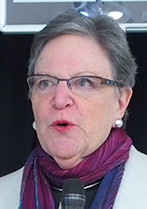 Dr. Carroll Seron
Dr. Carroll Seron